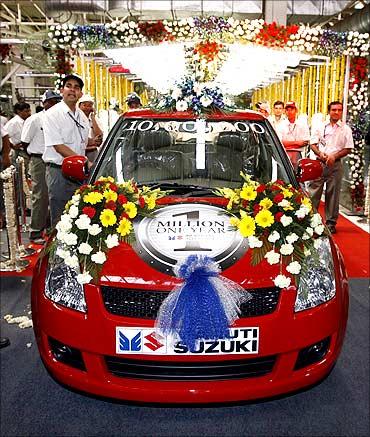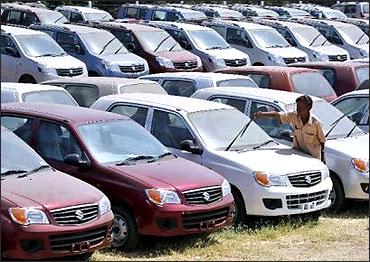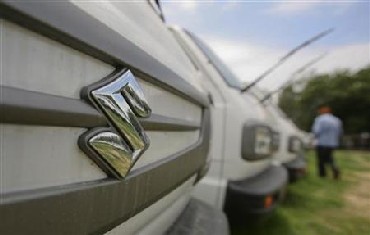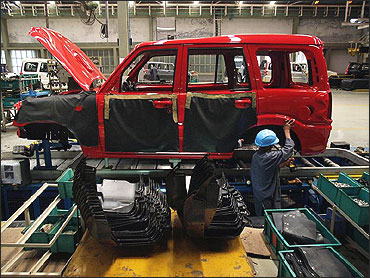Photographs: Reuters Sharmistha Mukherjee in New Delhi
Satbir Yadav, 27, resident of Barabanki in Uttar Pradesh bought his first car in June this year. The harvest had gone well and his mother had insisted that her grandchild, who was expected some time in August, would have to be brought home in the family's first car.
So Yadav got in touch with Sanjay Singh (Maruti Suzuki's rural dealer's sales executive), and within a week was the proud owner of a steel blue WagonR.
As with Yadav, several other consumers across regional centres in India have purchased over 20,000 Maruti Suzuki cars in the last six months.
Mayank Pareek, managing executive officer (marketing & sales), Maruti Suzuki India Limited (MSIL) says, "There are sets of consumers in and around regional centres who are relatively unaffected by the fluctuations in the domestic market. They are cash-rich and are not dependent on financing solutions to buy vehicles."
. . .
Revealed: How Maruti plans to boost its sales
Photographs: Reuters
So at the beginning of the current financial year when the domestic automobile industry started to depict the first signs of a slowdown, MSIL resolved to intensify focus on such niche segments to bring in the additional numbers.
The company mandated regional marketing teams to identify one such consumer set in every region every quarter. By June this year, Maruti Suzuki had put together a data set to reach out to 76 groups of potential customers.
The target buyer in these niche segments did not have any immediate need to own a vehicle but had ready cash at hand. They hailed from diverse vocations.
While some owned orange orchards in Nagpur, others cultivated turmeric or traded in granite stones in Tamil Nadu. Prospective buyers also included fisheries' owners from West Bengal, blue pottery makers from Jaipur and groundnut growers from Saurashtra.
. . .
Revealed: How Maruti plans to boost its sales
Photographs: Reuters
The challenge, says a senior executive in the company, was to create demand among these consumer sets by reaching out to them directly.
"Our RDSEs are the front-end in such transactions. They know the local language and help in sensitizing the consumers about the benefits of owning a vehicle. For instance, if there is some emergency in the area where the customer belongs to, it would be difficult to reach the district centre using mass transport. And since our customers are cash-rich they can afford more convenient alternative means."
Seasonality is taking into account while reaching out to buyers in the niche segments. Harvest time is more propitious, translating such negotiations into actual sales.
The RDSEs assist the prospective buyers in availing of financing options if required.
"Consumers in niche segments are often apprehensive of paperwork. If they require financing, the RDSEs accompany them to local banks. They are offered options to pay in equated installments, sometime on a half-yearly basis as compared to EMI schemes doled out in cities," added the executive.
. . .
Revealed: How Maruti plans to boost its sales
Photographs: Reuters
The intensive exercise has paid off for Maruti Suzuki. Niche buyers account for as much as 7 per cent of all mini cars (hatchbacks measuring less than 3600 mm in length with engine displacement up to 1.0 litre) sold by MSIL between April and November this fiscal, and the numbers are growing.
Pareek said, "While we used to sell 500-odd units every month last year to buyers belonging to such categories, our volumes from niche segments have now grown nine-fold to 4,500 units a month post the marketing initiatives we undertook. This is the tip of the iceberg. There are 650,000 villages in India, the opportunities are immense."
Most of these buyers went in for established brands - the best-sellers from the MSIL stable such as the Alto and the WagonR.
Few opted for Omni and Eeco, which double up for both personal and professional use. Most cars sold to buyers in the niche segment are tagged between Rs 2.5 lakh (Rs 250,000) and Rs 4.5 lakh (Rs 450,000).
As much as 70 per cent of consumers in the Indian market avail of financing options while purchasing vehicles.
. . .
Revealed: How Maruti plans to boost its sales
Photographs: Reuters
With the Reserve Bank of India (RBI) hiking lending rates 13 times since mid-2010, the automobile industry has come under pressure with most entry-level buyers postponing fresh purchases.
Data available with industry body Society of Indian Automobile Manufacturers (SIAM) shows that till October sales in the mini segment have declined by over 11 per cent to 333,631 units. For MSIL, the drop has been sharper at around 16 per cent.
Between April and October this fiscal, the company could sell only 259,909 cars in the mini segment which account for around half of the overall volumes for Maruti Suzuki.
Post the labour disruptions, which saw sales dip by as much as 52 per cent to 51458 units for the company in October this year, Maruti is now trying to up marketing efforts to reach last year's sales volumes.
"That in itself is a challenge," says R C Bhargava, chairman, MSIL. But, for now, the country's largest car maker is leaving no stone unturned to bring in those extra numbers.







article